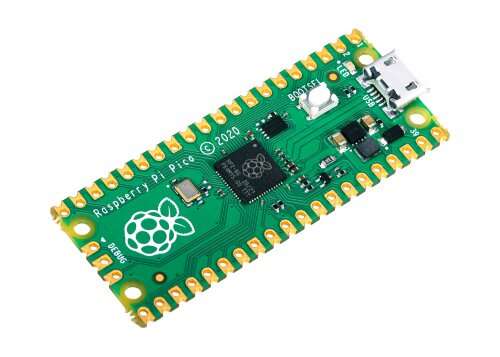
Raspberry is introducing a new member to its family: a microcontroller. And its price won’t set anyone back too much: The new Raspberry Pi Pico costs about the same as a box of fresh-picked raspberries at the grocery store, $4.
This is the first microcontroller for the Raspberry Pi Foundation, which has built a large, loyal following for its line of low-cost microcomputers. The foundation built its own chip for the microprocessor. The RP2040 features a dual-core ARM 133 MHz processor, 264 KB of RAM, a micro-USB port and a temperature sensor. It has 2 MB flash memory onboard and the capacity to expand to 16 MB with external memory. It also comes with 30 general-purpose input/output pins that allow for connection with a broad variety of hardware.
Raspberry enthusiasts are well-known for their imaginative, complex and sometimes wacky innovations. Do-it-yourselfers have designed facial recognition tools, mini-drones, cat feeders, air-quality monitors, video doorbells, laser-beam tripwires, digital theremins, talking toasters and weather stations. The Pi in the Sky captures spectacular atmospheric images aboard a weather balloon. The Beetbox lets you create a rhythm for your music, offering an interactive drum kit composed of vegetables, mainly beets. Tea-Pi brews a cup of tea. And Swear Bear analyzes your conversations and tabulates the number of naughty words used.
The Raspberry Pi Pico has no built-in Wi-Fi or Bluetooth.
The foundation said in a website log that it had three objectives for the RP2040: high performance, a flexible input/output system that can connect to a variety of external devices and low cost.
“We ended up with an incredibly powerful little chip,” the blog states, “cramming all this into a 7 × 7 mm QFN-56 package containing just two square millimeters of 40 nm silicon.”
The microprocessor’s power supply chip demands very little power, supporting input voltages between 1.8 volts and 5.5 volts. That means devices can run on a couple of AA batteries or a single lithium-ion cell.
“It seems like every fruit company is making its own silicon these days, and we’re no exception,” the foundation says. “RP2040 builds on the lessons we’ve learned from using other microcontrollers in our products.
As described by TechCrunch, microcontrollers are specifically designed to interact with other devices. “They’re cheap, they’re small and they draw very little power. You can start developing your project with a breadboard to avoid soldering. You can pair it with a small battery and it can run for weeks or even months. Unlike computers, microcontrollers don’t run traditional operating systems. Your code runs directly on the chip,” TechCrunch says.
The Raspberry Pi Foundation has partnered with Adafruit, Ardiuno, Pimoroni and Sparkfun in the creation of accessories for the Raspberry Pi Pico.
The new unit is available at the Raspberry Pi store at newark.com. Those who subscribe to the physical edition of HackSpace magazine will receive a free copy of the microprocessor with this month’s edition.